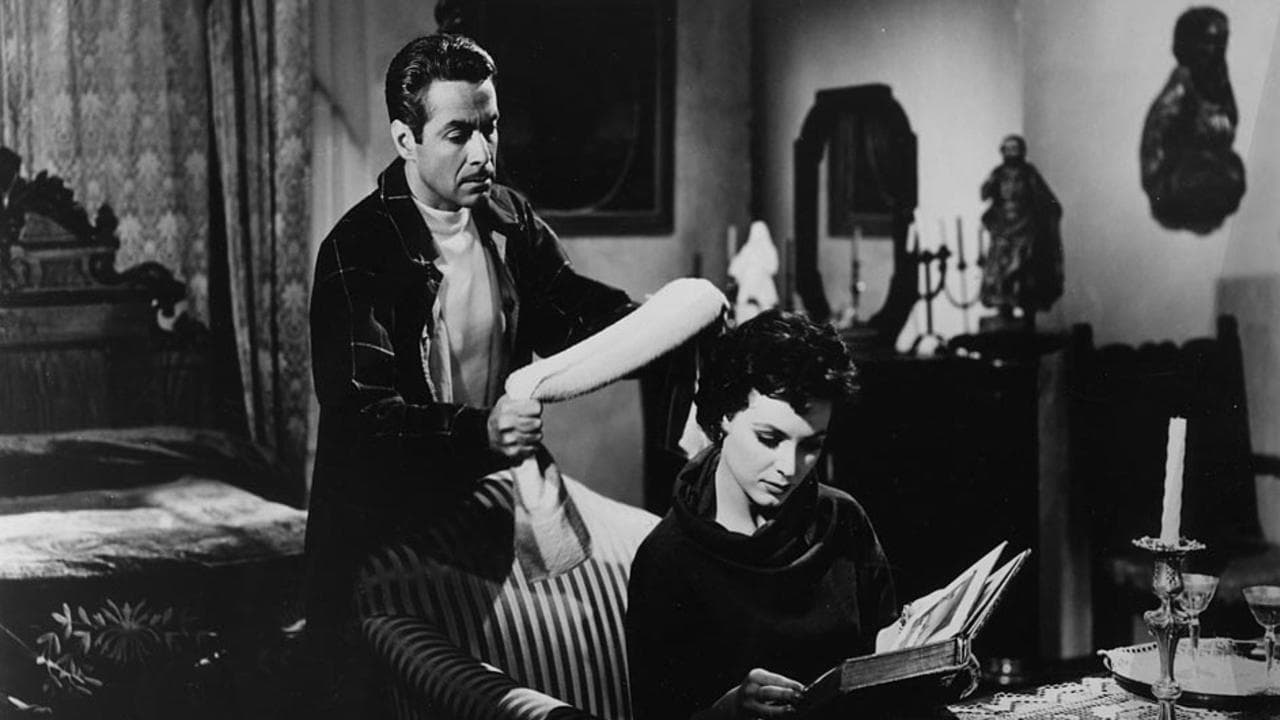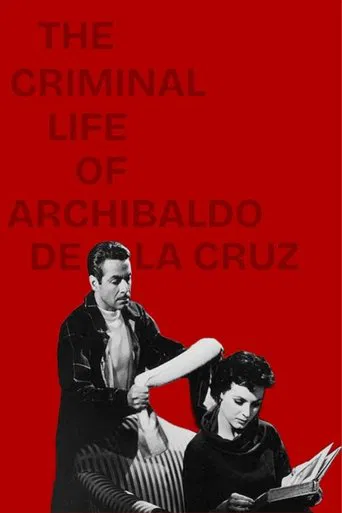

What a waste of my time!!!
... View MoreThe performances transcend the film's tropes, grounding it in characters that feel more complete than this subgenre often produces.
... View MoreThis is a coming of age storyline that you've seen in one form or another for decades. It takes a truly unique voice to make yet another one worth watching.
... View MoreThe movie runs out of plot and jokes well before the end of a two-hour running time, long for a light comedy.
... View MoreThe most ironic thing about this early Bunuel film is the English title: Archibaldo does not commit a single crime in the entire course of the film! Actually, much like his murderous plans, the film plays better in one's mind than in reality; the opening is intriguing and there are successful isolated moments, but on the whole this black comedy is talky, meandering and belabored. It lacks a certain craziness, a certain spark - a spark like what the lively Rita Macedo provides in her scenes. The ending is almost jarringly happy - Bunuel must have been in an especially good mood when he was making this one. **1/2 out of 4.
... View MoreThat of course is where Jesus supposedly said "You have heard that it was said, 'You shall not commit adultery.' But I tell you that anyone who looks at a woman lustfully has already committed adultery with her in his heart." That is to say, thinking about doing a thing is as bad as doing it. That precept never made much sense to yours truly, and apparently it didn't to Luis Bunuel either, because the whole point of this movie seems to be to refute that notion. The title character fantasizes about killing various women he comes across, but circumstances always seem to conspire to prevent it. At the end when he demands to be arrested, an authority figure replies, in effect, "For what? You didn't do anything." The best part of the film is the opening sequence apparently taking place around the end of the Mexican revolution period c. 1920, with Archibaldo as an insufferably spoiled only child giving grief to his long-suffering but stoic nanny. Filmed in Bunuel's trademark style with long takes and barely perceptible camera movements, this battle of wills is fascinating until the arrival of the lad's rich idiot mother (rich idiots being one of Bunuel's favorite lifelong targets). Meanwhile the nanny watches through the window as a gun battle unfolds in the street below; she catches a stray bullet, and young Archibaldo finds himself fascinated with her corpse. Cut forward to the adult Archibaldo, now a rich idiot in his own right plus an obsession with being a serial killer. This main part of the film was less interesting for me, mostly because Bunuel allows the adult actor to perform almost like a cartoon, with bulging eyes and goofy leer, like a mentally retarded Snidely Whiplash. The supporting cast are competent performers but in my memory I have trouble telling some of them apart. There are some nice fantasy sequences, such as Archibaldo ordering his bride to undergo an elaborate Catholic ritual before shooting her. Probably the best known sequence, Archibaldo cremating a mannequin, left me more or less unmoved, although it probably seemed more sensational in 1955. Part of the problem here is that, as in the later "American Psycho," how compelling is it if all the bad stuff takes place inside the guy's head? Also there's a lack of that great sexual tension that Bunuel was able to generate in some of his other Mexican work, such as "Susana" or "El Bruto." But certainly it's a must see at least for Bunuel fans; like Hitchcock's "The Trouble with Harry" from the same year, this is the closest this director comes to true whimsy (especially the parts with the American tourists) in a career of mostly much darker shades.
... View More"Ensayo de un Crimen" describes a man that after a childhood experience intimately connected with a music box revels in murder dreams - sex, pleasure and murder being intimately linked: In the time of the Mexican revolution his baby-sitter was killed by a stray bullet in front of him. As she is lying there dead and defenseless, blood running down her throat, going down her thighs, the boy feels deep pleasure and power. All this is punctuated by the sound of a musical box. In the chaos of the times the musical box disappears and these feelings are buried and forgotten. One day, Archibaldo de la Cruz, already a grown man, finds that musical box in a shop and, barely concealing his excitement, buys it and his old dreams come to the surface again.In the beginning of the film (after a mysterious accident suffered by a nun), he goes to the police station in order to confess a murder and tells the story of his life to the police chief. His life is shown in flashbacks and shows the life he led and the women he met. From now on it is difficult to tell reality from dreams.Buñuel is a very good actor's director and aptly describes the straight-jacket morality of the time where official marriage is mandatory (for women this is like a prison where the warder is her husband), and the icons of the catholic church are a dominant presence. Here are the essential elements present in the films of Buñuel. Fantasy/ Reality, double-standard morality and the church - the only road to freedom seems surrealism, fantasy overtaking reality.Buñuel's films are sensuous and full of atmosphere and here as usual reality is not what it seems. Even if he, in his early Mexican films, seems to make concessions to the producers, you will notice under the surface all the themes that obsessed Buñuel and that would come to the foreground in films like "Viridiana", "El Angel Exterminador", "Belle de Jour" etc..
... View More(Spoilers) Misogynistic, yet emasculating serio-comedy from the great Buñuel. I have just seen this one for the second time, and enjoyed it even more than before. Although it has misogynistic implications (actually rather more explicit than implicit), the fact that Archibaldo (perfectly played by Ernesto Alonso)never does succeed in carrying out his daydreams of harm to the various women in his life, this fact emasculates his character. The women are not victorious, however, for for every Archie and his failed attempts, the ladies all suffer at the hands of the other men in their lives. Therefore, the misogyny prevails.I was a bit offended by this film the first time around (when I saw it about 3 years ago), but having seen more of Buñuel's work and more films, both foreign and domestic (US)) of its ilk since, I decided to give it another chance, and am glad that I did. The movie's ironic nature saves it from being too cruel to enjoy. That and the fact that, after the talk with the doctor, Archibaldo seems to reform at the film's end, drowning (in effect burying or suppressing) the music box (the symbol of his deranged desires, and the object to which he attributes dominance, power and virility), throwing away his cane (another crutch), and walking off with Lavinia, who seemed to make him happiest during the film (as opposed to the other women).The characters of Particia and Carlota (and Lavinia, to a slightly lesser extent) are seen as shrewish and scheming they certainly all have their own agendas and never come across as wholly innocent which lends feelings of sympathy towards Archibaldo (who is being used by all of them).Themes of Catholicism pervade the film, although not in a heavy-handed way. The symbolism, typical of Buñuel, was strong and put to good use, i.e.: the mannequin (represents Lavinia), the music box (see above), the straight razor (a phallic symbol and violence), the cane (a `crutch'), the pottery wheel (goes around and around and no way out, representing Archie's situation), the flaming drink (foreshadows his fantasy for Lavinia), her tour guide/interpreters job (language barrier miscommunication/repression of the true feelings of the characters).It is interesting to note that Alejandro, the married man with whom Carlota is having an affair, is often addressed as `Architect' instead of by his name. An architect creates and builds, whereas his character destroys another great touch in a movie full of them.Some thoughts: 1) How long will Archie's reformation last if it is genuine at all? 2) I felt sorry for Archie for not being able to actually carry out one of his dastardly fantasies instead, in each case, he was `saved' by circumstance. This was surely the filmmakers' intent. Well, it worked! 3) Archie is guilty, in his mind, of actually committing the crimes hence his `confession' to the doctor. This is why he throws the music box (he thought it was partially responsible) in the pond. Good character development/insight into his psyche. 4) I think the writer(s) and director did a an excellent job of conveying to us Archie's early life at home with his mother (who didn't seem to care about him), the hated Nanny (whose death started the chain of events), and the (absent) father. In including this glimpse of his early life, we gain a better understanding of Archie's character (his up-bringing plus this event) and can perhaps conclude that these may be contributing factors to why he did what he did/why he was who he was.RECOMMENDED!
... View More